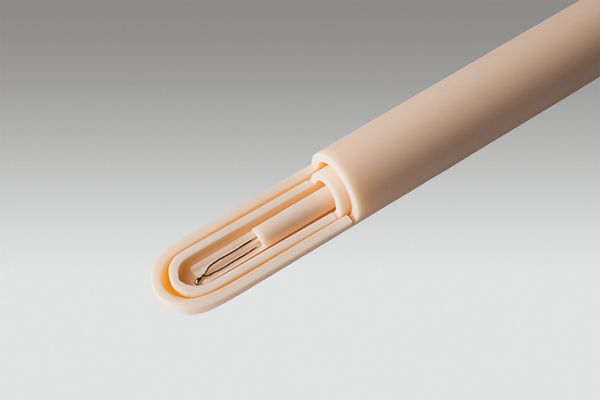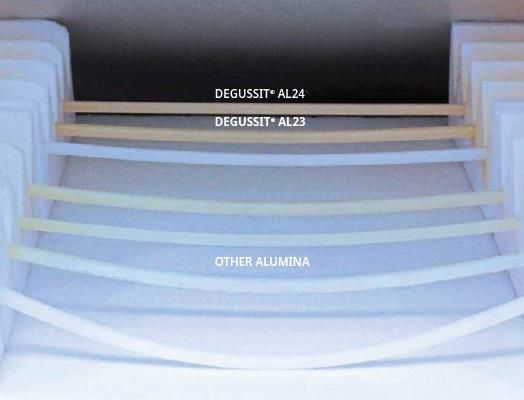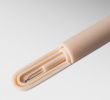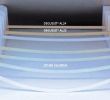Alumina tubes C799 (formerly C710)
Kyocera DEGUSSIT AL23 pure alumina tubes (99.7% alumina) are generally manufactured by extrusion or even cold isostatic pressing for larger diameters (also called CIP = Cold Isostatic Pressing). They are mainly used in high temperature pyrometry, up to 1800 °C as well as to manufacture tubular laboratory furnaces. Capillaries (or multi-channel tubes) and pure alumina beads serve as electrical insulators at high temperatures. We offer a wide standard range of alumina tubes ranging from 0.5 mm diameter to 170 mm. We also offer thin-walled alumina tubes: 0.5 mm. Grooved alumina tubes are also available as standard to position a heating wire on the outer diameter. Alumina tubes closed at one end are also called sheaths or glove fingers.
Why use pure alumina tubes?

Kyocera high purity alumina DEGUSSIT AL23 is an electrical insulating ceramic at high temperatures up to 1800 °C. It is used in the manufacture of type S thermocouples with platinum and platinum-rhodium 10% wires. Platinum wires are electrically insulated in a capillary with 2 or more channels. The welding of the thermocouple wires as well as the capillary are protected by a pure alumina sheath. The very low silica content prevents the formation of eutectic compounds with platinum and therefore a break of platinum wires. The service life of thermocouples is greatly improved compared to the use of standard tubes on the market in pure alumina C799 (formerly standard C710) in which fluxes or silica are sometimes found in too large quantities, in order to facilitate sintering and therefore reduce manufacturing costs to the detriment of the service life of the cane.
Why do DEGUSSIT AL23 pure alumina tubes differ from other pure alumina tubes on the market?

What differentiates DEGUSSIT AL23 pure alumina from other pure aluminas on the market is that it contains no or few fluxes. In particular, its silica (SiO2) concentration is very low < 100ppm. This gives the DEGUSSIT AL23 alumina tube very good thermal properties, such as excellent resistance to creep at high temperatures as well as corrosion, thermal shock and wear. In addition, alumina has a very good thermal conductivity. For these reasons, DEGUSSIT AL23 tubes, protective sheaths and multi-channel capillaries are used in the glass industry or in instrumentation and high temperature analysis up to 1950 °C against 1700 °C generally for other C799 alumina tubes on the market.
Standard range of pure alumina tubes
Tubes, protective sheaths, multi-channel capillaries, insulating beads are available in the form of standard products available from stock in a wide range of sizes from diameter Ø0.5 mm to diameter Ø170 mm or even more in special manufacture up to diameter Ø450 mm, depending on length. Pure alumina tubes up to diameter Ø80 mm are obtained by extrusion and then by cold isostatic pressing called "CIP" for larger diameters. The drying of the extruded dough is done in rotation on rollers and the sintering (= baking) in the oven is done vertically thus limiting the curvature of the alumina tubes. The shrinkage at sintering being important, of the order of 18% linear, extruded tubes offer tolerances of ±5% on the inner and outer diameters as well as a deflection (or curvature) of 0.5% of the length. For example, the maximum deflection of a 1 meter long tube will be 5mm.
Pure alumina tubes for the construction of laboratory furnaces
The large diameter tubes make it possible to produce high-temperature laboratory tubular furnaces (horizontal or vertical) up to 1800 °C and thus to reach the melting temperature of many products. In case of controlled atmosphere: reductive, inert or vacuum; The tubes or sheaths (also called mittens) are prowled at the ends by machining so as to obtain a clean and precise joint reach. Most of the time, the seal is cooled via a water box, by circulating cold water around the polymer seal. Otherwise he would burn. The heating resistors are wound around the alumina tube which then acts as a support. Then the heating resistive winding is embedded in a layer of refractory cement. Then comes the layer of microporous or fibrous insulation.
Ceramic bubbling tubes for the glass industry.
Alumina tubes are used in the glass industry as bubbling machines. The central hole of the bubbling tube allows air to be injected directly into the molten glass bath. Thus they allow a forced convection of the glass in the liquid state and therefore a better mixing of the composition. The high corrosion resistance of pure alumina DEGUSSIT AL23 allows direct immersion in the molten bath.
DEGUSIT AL23 alumina tubes have been developed specifically for the glass industry. In particular, their low rate of silica and fluxes considerably increases their corrosion resistance (no intergranular corrosion in the glass phase) as well as their resistance to creep at high temperature (no glass phase that loses its mechanical properties at high temperature and allows the mobility of the grains between them).
Pure alumina tubes for R&D and high-tech applications
DEGUSSIT AL23 alumina tubes due to their superior properties to other C799 alumina on the market are naturally used in demanding applications at our customers: CEA, CNRS.






